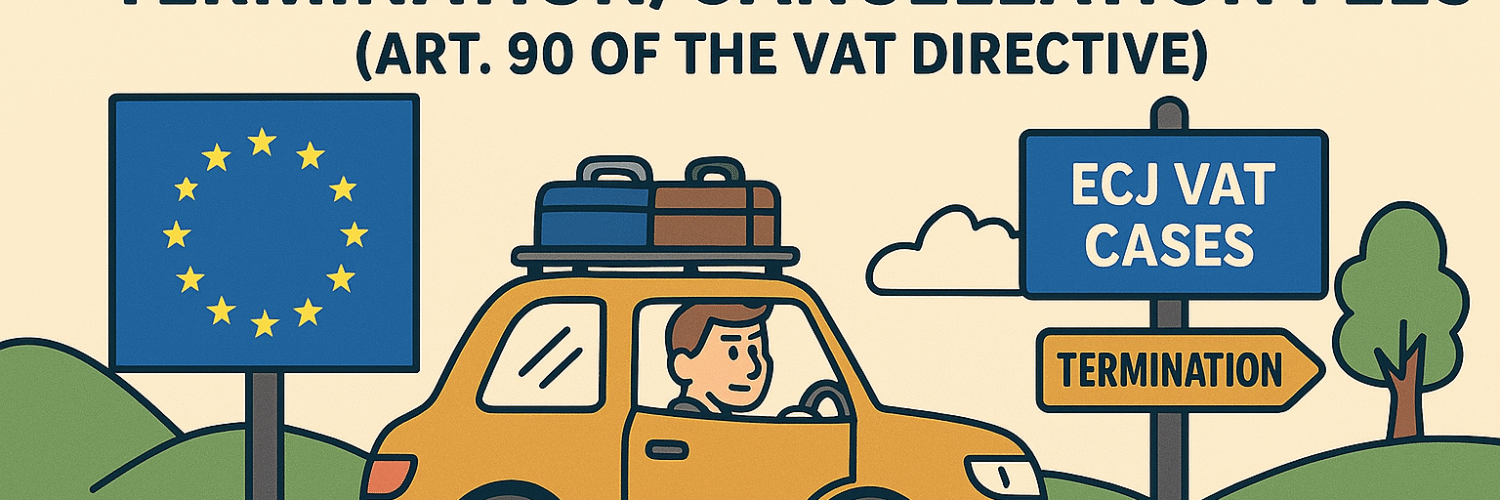Last updated: October 16, 2025
The ECJ has decided in few cases on the determination of the Taxable Amount if contracts are terminated or in case of payment cancellation fees.
Importance of art. 90 of the EU VAT Directive 2006/112/EC.
Article 90 of the EU VAT Directive 2006/112/EC plays a crucial role in ensuring fairness and proportionality in the VAT system. Here’s why it’s important:
Adjustment of Taxable Amount
- Core Principle: Article 90 requires that the taxable amount for VAT be reduced when the price is reduced after the supply, or when the supply is cancelled, refused, or not fully paid.
- This ensures that VAT is only levied on the actual consideration received by the supplier.
️ Protection for Businesses
- It protects suppliers from having to pay VAT on amounts they never actually collect—such as in cases of bad debts, returns, or contract cancellations.
- Without this provision, businesses would face a disproportionate tax burden, especially in sectors with high cancellation or default rates.
National Flexibility
- Article 90(2) allows Member States to derogate from the general rule in specific cases, such as non-payment, to prevent abuse or administrative complexity.
- This flexibility has led to divergent practices across the EU, with some countries requiring proof of irrecoverability before allowing VAT adjustments.
⚖️ Legal and Practical Impact
- It is often at the center of disputes involving cancellation fees, credit notes, and bad debt relief.
- The ECJ has interpreted this article in several landmark cases, clarifying when and how VAT adjustments must be made.
In short, Article 90 is a key safeguard that aligns VAT liability with economic reality, ensuring that tax is only paid on actual revenues.
Article in EU VAT Directive 2006/112/EC – Art. 90
Article 90
1. In the case of cancellation, refusal or total or partial non-payment, or where the price is reduced after the supply takes place, the taxable amount shall be reduced accordingly under conditions which shall be determined by the Member States.
2. In the case of total or partial non-payment, Member States may derogate from paragraph 1.
ECJ Cases – Decided
- C-215/94 (Mohr) – An indemnity for the abandonment of milk production is not subject to VAT
- C-384/95 (Landboden-Agrardienste) – A national compensation scheme not to harvest at least 20% does not constitute a supply of services
- C-277/05 (Société thermale d’Eugénie-Les-Bains) – Reservation for an accomodation was outside scope of VAT
- C-310/11 (Grattan) – Mail-order agent’s credit does not lead to a reduction in tax base
- C‑250/14 and C‑289/14 (Air France-KLM and Hop!Brit-Air) – The issue by an airline company of tickets for domestic flights is subject to VAT where those tickets have not been used by passengers
- C-295/17 (MEO – Serviços de Comunicações e Multimédia) – Judgment – VAT on early termination of broadband deal
- C-43/19 (Vodafone Portugal) – Termination fees are subject to VAT
- C-622/23 (RHTB) – VAT Implications in Work Contract Cancellations
ECJ Cases – Pending
Briefing documents & Podcasts
C-622/23 (RHTB) – VAT Implications in Work Contract Cancellations – VATupdate
- Join the Linkedin Group on ECJ/CJEU/General Court VAT Cases, click HERE
- VATupdate.com – Your FREE source of information on ECJ VAT Cases
- Podcasts & briefing documents: VAT concepts explained through ECJ/CJEU cases on Spotify
Latest Posts in "European Union"
- EU to Scrap €150 Customs Exemption by 2028, Introduce €2 Levy in 2026
- EU Abolishes €150 Customs Threshold to Curb Small Parcel Influx and Ensure Fair Competition
- ViDA Implementation Strategy: Preparing Industry for VAT Reform in the Digital Age
- EU to Remove €150 Customs Duty Exemption for E-Commerce Parcels from 2026
- Roadtrip through ECJ Cases – Focus on the Exemption for Intra-Community supplies of goods (Art. 138)














